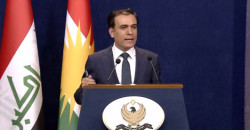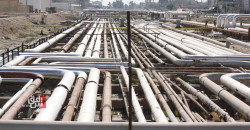Federal oil ministry blames producers for the halt of Iraq's oil exports via Turkiye

Shafaq News/ Iraq's oil ministry on Monday fired back at the Association of Petroleum Industry in Kurdistan (APIKUR), refuting claims that the federal government is to blame for the stalled oil exports from the Kurdistan Region.
About 450,000 barrels per day of crude once flowed through Iraq's northern oil export route via Turkiye, and its closure has led to the loss of roughly $11 billion to $12 billion for Iraq, according to APIKUR estimates.
Ankara halted flows on March 25, 2023, after an arbitration ruling found it had violated provisions of a 1973 treaty by facilitating oil exports from the semi-autonomous region of Kurdistan without the consent of the Iraqi federal government in Baghdad.
The court ordered Ankara to pay Baghdad $1.5 billion in damages for unauthorized exports between 2014 and 2018. A second ongoing arbitration case covers the period from 2018 onwards. The countries remain embroiled in a protracted legal tussle.
"Following negotiations, Iraq and Turkiye agreed to restart pipeline operations and address technical issues arising from the closure," the ministry said. "The federal government has borne the brunt of the export halt due to reasons pertaining to sovereign oil policy, among others."
The ministry added that the "foreign companies" rejection to hand over production to the Region's government as the primary reason for the current situation.
"Resumption of exports hinges on these companies complying with the law and officially delivering the oil produced from the Kurdish fields."
The ministry reiterated its commitment to a swift resumption of exports through the pipeline, adhering to constitutional and legal frameworks.
"Non-adherence to the federal government's established oil policy jeopardizes Iraq's international standing and commitments," the ministry warned.
The Kurdistan Regional Government (KRG) and the companies have yet to submit copies of their contracts for review, hindering efforts to establish new agreements compliant with Iraqi law, it continued. "The parliament adopted the production cost set by the Federal Ministry of Oil because neither the assembly nor any other federal entity had access to the contracts."
The statement hinted at unresolved outstanding debts that amount to billions of dollars owed by APIKUR to the Region's government. "These opaque debts, unknown to the federal government, deviate from standard borrowing practices."
The ministry lambasted the recent statement by APIKUR, viewing it as "blatant interference in Iraq's internal and external sovereign affairs."
"Foreign companies seeking to operate in Iraq must respect the country's sovereignty, laws, and judicial rulings. They should adapt their operations accordingly, not interfere in Iraq's sovereign matters and foreign policy," the ministry concluded.
On Saturday, APIKUR accused the Iraqi government of failing to take "the required actions to reopen the Iraqis-Turkish Pipeline and enable oil exports from the Kurdistan Region of Iraq," despite Turkiye's announcement in October 2023 that the pipeline is operational and ready to export oil.
"To date, neither APIKUR nor its members have seen any proposal from the GoI or KRG that would lead to a resumption of exports," it said.
APIKUR said it has conveyed to senior members of US Joe Biden's administration and members of the U.S. Congress that "the White House should not proceed with the planned visit of Iraqi Prime Minister Mohammad Shia Al-Sudani, on April 15, 2024, to Washington, DC unless ITP is reopened and allows oil produced in the Kurdistan Region to be exported to international markets, International Oil Companies (including APIKUR members) get surety of payment for past and future oil exports, the Government of Iraq fully implements the Iraqi federal budget for the Kurdistan Regional Government."





